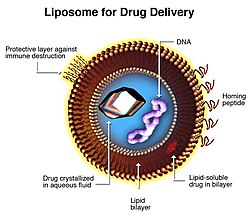Liposomes are spherical marvels of nature, composed of a lipid bilayer that envelops an inner compartment. Their unique structure has been a subject of fascination for scientists, and it is no wonder why. The lipid bilayer of these microscopic wonders enables the entrapment and transport of a multitude of drugs, enzymes, and nutrients, making them a multi-faceted tool in the ever-expanding field of medicine and health. They are truly a beacon of hope in the quest for improved health and wellness.
What are Liposomes?
These nanoscale spheres are composed of a lipid bilayer that encases a central compartment, much like the cell membranes that envelop our own cells. This unique architecture enables the entrapment and transport of a wide array of substances, ranging from drugs, enzymes, and nutrients. Science has long been intrigued by these wonders of nature and has deemed them a promising tool in the ever-evolving fields of medicine and health. Their superiority over traditional drug delivery systems only adds to their allure and potential in improving our overall well-being.
The Benefits of Liposomes
The beauty of this design lies in its ability to safeguard entrapped substances from degradation, all while precisely targeting specific cells or tissues in the body. The lipid bilayer serves as an impenetrable shield, preserving the integrity of the substance as it travels through the body. This translates to a higher level of efficacy, as the substance arrives at its intended destination in its active form, ready to carry out its intended purpose with potency. It’s a true testament to the brilliance of nature’s design.
Liposomes are seriously cool! They’ve got this special skill of taking drugs that are hard to dissolve and making them more effective. By encapsulating these drugs in their inner compartment, liposomes increase their solubility and bioavailability. This means we get more of the drug where it needs to go, and with fewer side effects.
Liposomes in Health and Wellness
Liposomes have proven to be a versatile tool in the realm of health and wellness, lending their unique properties to various applications. In the world of skincare, these nanoscale structures have been harnessed to deliver active ingredients such as vitamins and antioxidants directly to the skin, enhancing its health and reducing the signs of aging. The oral cavity too, has benefitted from the use of liposomes, as they have been employed to deliver antibiotics, antimicrobials, and enzymes to improve oral hygiene and reduce the threat of gum disease. And finally, liposomes have been utilized in nutrient delivery, bringing vital vitamins, minerals, and other nutrients to the body and thereby promoting overall health and well-being.
Liposomes in Medicine
Liposomes have proven to be a versatile carriers not just in enhancing health and wellness, but also in the realm of medicine. These tiny spherical structures, composed of a lipid bilayer and an inner compartment, have been employed in the delivery of drugs to targeted cells, the visualization of bodily tissues through imaging, and even the detection of biomarkers in diagnostics. The unique properties of the lipid bilayer have made liposomes a valuable tool in a multitude of medical applications.
Liposomes: The Future of Health and Wellness
Liposomes have the potential to revolutionize the field of medicine and health, providing a more effective alternative to traditional drug delivery methods. As we delve deeper into the intricacies of these tiny spherical structures, it becomes clear that they hold great promise for the future. With continued exploration and technological advancements, the potential applications of liposomes are vast and varied, and we can only imagine what the future may hold.
Reputable health supplements brands such as Renuebyscience are already adopting liposomes for their NAD+ complex supplements, you should check them out if you are interested in learning more about liposomes, You can even get a discount that Renuebyscience is offering for a limited time on various supplements.
Liposomes have already proven themselves to be a valuable asset in various sectors of the health and wellness industry, be it for cosmetic purposes, oral health, or even delivering drugs and diagnosing conditions. The properties of this unique structure make them an excellent tool, capable of protecting the enclosed substance, targeting specific cells and tissues, and enhancing the solubility and efficacy of drugs. Undoubtedly, with further research and advancements, the role of liposomes in enhancing the well-being of people globally will only become more prominent.




